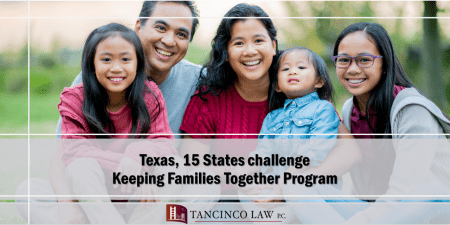Just four days after the implementation of the Parole in Place program for spouses of U.S. citizens, a lawsuit was filed seeking to suspend it. As of August 23, 2024, the plaintiffs have filed a Motion for Temporary Restraining Order, Preliminary Injunction, and Stay of Agency Action, challenging the Biden administration’s Keeping Families Together program, also known as Parole in Place. The lawsuit was brought by Texas and Idaho, along with 14 other state attorneys general from Alabama, Arkansas, Florida, Georgia, Iowa, Kansas, Louisiana, Missouri, North Dakota, Ohio, South Carolina, South Dakota, Tennessee, and Wyoming.
In their 67-page court filing, the plaintiffs assert that the program is illegal, arguing that it exceeds the executive branch’s authority to set immigration policy. They claim that the program constitutes a misuse of parole authority, stating, “The Biden-Harris Administration — dissatisfied with the system Congress created, and for blatant political purposes — has yet again attempted to create its own immigration system.”
Kelli Stump, President of the American Immigration Lawyers Association (AILA), responded to the lawsuit, saying:
“This is another example of states attempting to stop the federal government from using its well-established legal authority to promote family unity. In its place, these states and Stephen Miller, the architect of Donald Trump’s anti-immigrant policies, hope to re-institute a xenophobic, anti-family, anti-American agenda. We are talking about the family members of U.S. citizens who have been stuck in long-term legal limbo and, through Keeping Families Together, can now apply for legal status rather than endure an arduous and unworkable bureaucratic process. These are individuals who have been living in the United States for at least a decade and are contributing to American communities. It is reprehensible and nonsensical that these states want to undermine the core American value of strengthening families when cutting the red tape will also ensure a more secure and fairer immigration system. From a purely legal standpoint, the states are advancing weak, baseless arguments to justify their standing to sue that in no way merit the program being enjoined. While the program remains in effect, AILA members will continue to help their clients apply for this life-changing protection.”
At present, USCIS continues to accept applications, although this could change if the plaintiffs’ motion is granted.
(Atty. Lourdes S. Tancinco is an immigration attorney and immigrant rights advocate based in the San Francisco Bay area and a partner at the Tancinco Law P.C. for 32 years. She may be reached at law@tancinco.com, www.tancinco.com, facebook/tancincolaw, or at 1-888-930-0808)


